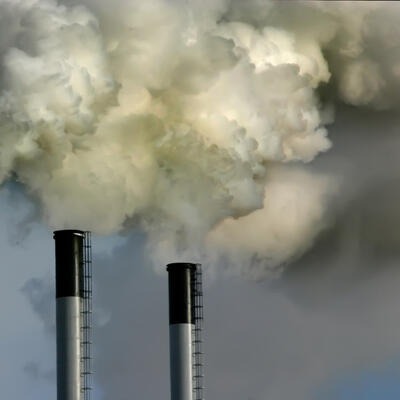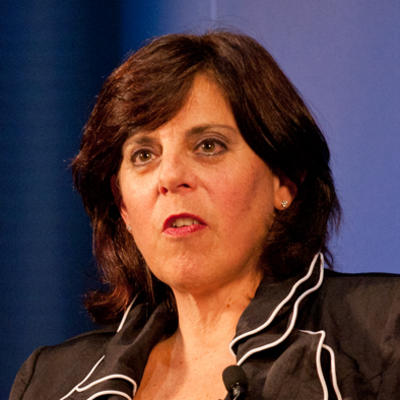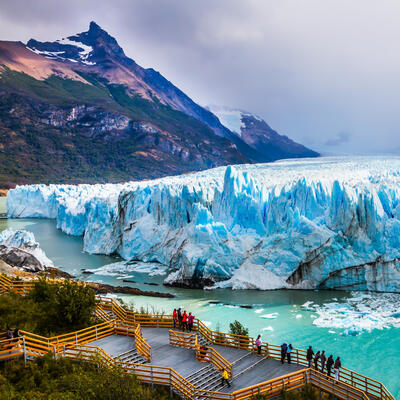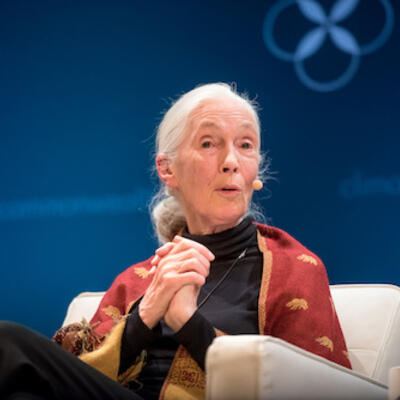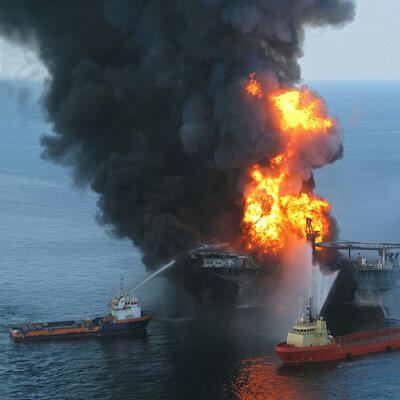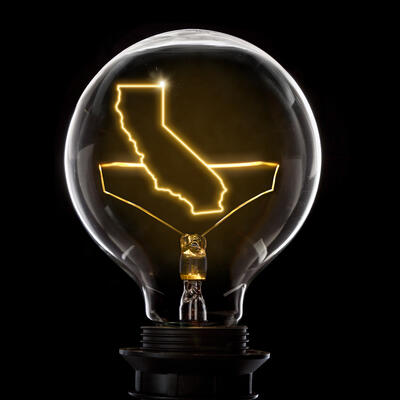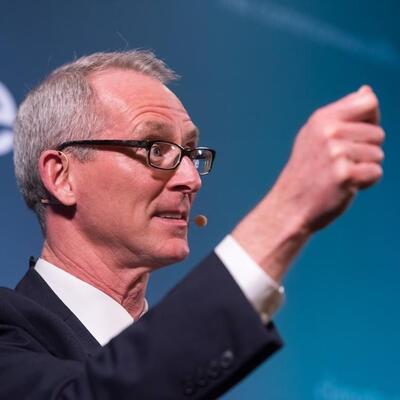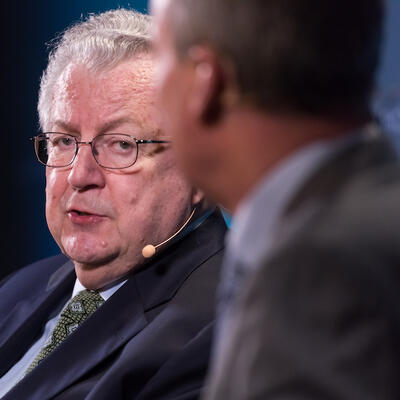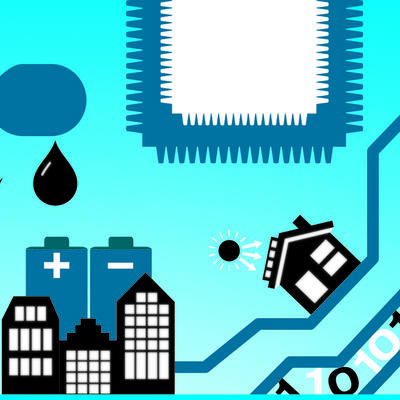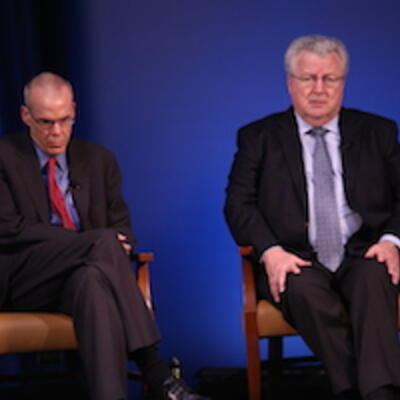Greg Dalton: Welcome to Climate One, a conversation about America's energy, economy, and environment. To understand any of them, you have to understand them all. I'm Greg Dalton.
Today, we're talking with an environmentalist and an oil industry veteran about the true cost of market space on the premise of "grow now, clean up later." That economic model fails to capture the positive benefits delivered by nature such as clean air and water. Corporate accounting systems also don't include the suicidal cost of production and consumption such as floods and droughts made worse by your car and mine.
Over the next hour, we'll hear how companies including McDonald's, Puma, Wal-Mart, Unilever and others are changing the way they measure success and operate in competitive markets. Along the way, we'll include questions from our live audience at the Commonwealth Club in San Francisco. Here, to discuss the greener shades of capitalism, we're pleased to have with us two guests.
Amy Larkin is author of
Environmental Debt: The Hidden Costs of a Changing Global Economy. She's former Director of Greenpeace Solutions, a project that the environmental group that works with corporations.
John Hofmeister is CEO of Citizens for Affordable Energy. He's former President of Shell Oil Company, a subsidiary of Royal Dutch Shell, the world's largest corporation by revenues. He's the author of
Why We Hate the Oil Companies: Straight Talk from an Energy Insider.
Please welcome them to Climate One.
[Applause]
Greg Dalton: Amy and John welcome. Thanks for coming.
Greg Dalton: Amy Larkin, tell us about the concept of
Environment Debt how things are not being fully measured in today's practice of capitals.
Amy Larkin: Well right now, the laws of nature and the rules of business are in a collision course. We all know about the two sides of a financial ledger profit and loss but there's also cause and effect. Every financial transaction has an environmental impact and the environment is embedded in every financial transaction. Every transaction. And the financial crisis and the environmental crises are inextricably connected. And until we address both of them together, we're in big trouble.
Environmental debt is the cause of doing business where you cause someone else to pay for your mess and your company or your consumption does not cover a cost, somebody else does. So should I give an example?
Greg Dalton: Sure.
Amy Larkin: Okay. Do you remember the floods in Thailand in 2011? The country was devastated. And in those floods, there was a terrible typhoon and it maybe or may not have been exacerbated by climate change but it became a terrible flood, became a catastrophic flood from a terrible flood because of deforestation, most of which happened 15 or 20 years before 2011.
So 20 years ago, 20 years before 2011, actions of a variety of logging companies on the Thai government caused catastrophic flooding 20 years later. So what did that have as a financial effect? Well for the people of Thailand, it was terrible but what about the factories that produced parts for Toyota and Honda? Well tens of thousands of workers lost their jobs in Kentucky, Singapore and the Philippines, and Toyota lost 3% of its annual output because of logging that happened 20 years before.
So what should those logs have caused? As a purchaser of a Toyota car, you didn't pay for them. As a purchaser of the wood, all along the chain, no one paid for those cause until the catastrophe hit. Those are the kinds of rules of business that have to change.
John Hofmeister: You can either change the rules or you can get people to voluntarily operate under their own rules, which recognize exactly what Amy is talking about. So 1997 was a big year in my former company when we chose to go a different path than the industry and to put a cost of carbon, begin to put a cost of carbon in every project, every capital project that we looked at.
And whether it was Athabasca Oil sands, whether it was Sokolin liquefied natural gas, whether it was gas or liquefied or gas to liquids, whether it was platforms in the Gulf of Mexico, each had to not only describe the capital cost of the project itself, but the cost of carbon that was associated with that project over time.
And the mitigation of how that carbon impact, putting a price on carbon, would affect operations down the road or financials down the road, we voluntarily imposed upon ourselves a mechanism to measure that. And in some cases, we didn't approve projects. In some cases, we did with mitigation, extra mitigation. But the reality is, Shell shares, the share price have suffered and the present competition hasn't gone that way.
And so the company was willing to take a share price hit. And if you check the share history over the last 10 years, you'll see that Shell shares are basically underperformed the market in which it competes because my former company absorbs those costs as part of doing business.
Greg Dalton: Well Marvin Odum, the current president of Shell Oil was here recently and we talked about the shadow price. He called it "funny money." They don't really charge themselves that $45 or $40 a ton of carbon pollution but they say, "If there's a price on carbon, this is the way this will pencil out."
So they're preparing for the future but is it fair to say really that the stock price of people on Wall Street aren't looking at that shadow price, they're looking at current revenues in the current quarter, right?
John Hofmeister: I can't speak for a whole of Wall Street but it has had an unsettling effect that this company, Royal Dutch Shell, would take into account the future issues of environmental impact as part of the way it does business.
Greg Dalton: There's a price for doing the right thing,
Amy Larkin, that's got to be a deterrent to other companies doing something like this.
Amy Larkin: Well, as John is talking, I'm thinking of what Puma did last year. Many of you probably know, Puma created the first ever environmental profit and loss statement and they worked with PricewaterhouseCoopers and Trucost to determine if the –
Greg Dalton: It's a consulting firm Trucost.
Amy Larkin: Yes, Trucost is a boutique consulting firm, to determine what would have happened if they actually paid for their environmental degradation in 2010 or 2011, I'm not sure which. And they determined that it would cost them $190 million if they had to pay for the environmental impact they were causing, which was 72 percent of their annual profit.
Now, they didn't pay for that but they were courageous enough to say to the world, "This is the real cost of doing business," which was an astonishing thing and instead of backing off from that, they are now revisiting it and taking lessons learned, making it better, refining the process.
And in fact, their parent company, PPR, which owns Yves Saint Laurent, Gucci and Stella McCartney are doing an environmental profit and loss statement for all of the brands. And several other multinationals are also coming forward and stating we cause environmental damage and we want to – I mean the inferred idea is that. "We don't want to continue to do this." But as John said, in the current rules of business, if we don't do it, the biggest polluter will make the biggest profit.
Greg Dalton: So why did Puma do that?
Amy Larkin: Puma did that because Jochen Zeitz, the CEO, and I'm sure others felt compelled to state the amount of environmental impact the company was causing and wanted to change the rules so that the entire sportswear industry, all of its competitors, will have to come forward and do that. And in fact, they are.
Several of other of Puma's biggest competitors, are in fact putting forth – they are in the process of creating environmental profit and loss statement as well. And in addition, PricewaterhouseCoopers' competitors are also doing similar projects. So KPMG has a report that they put out in 2011 that showed that the 3,000 largest global companies caused $2.15 trillion of environmental damage every year.
So for KPMG and Pricewaterhouse to do these kinds of studies, they're antagonizing all, not all, but many of their clients. This is not an easy thing for them to do. This is saying to their clients, "Hello, we're counting. We're counting your environmental degradation cost." That's a big courageous act sort of all the way around. And so that's one of the places where I am encouraged that we have the chance to change the rules of business because there are a few leadership corporations ready to start changing the metrics and the rules of business.
Greg Dalton: We'll get to a couple of those.
John Hofmeister, is this a threat or an opportunity to change the rules?
John Hofmeister: Oh, I think it's an opportunity. I don't see it as a threat at all. But here are two system changes that may sound as boring as watching paint dry but this is what would have to change.
There's an organization called FASB, the Financial Accounting Standards Board. FASB writes the rules for accounting and you'd rather watch your fingernails grow than go to a meeting of FASB board. It's B-O-R-E-D as what most people feel when they listen to FASB but it is the arcane and the detailed accounting rules, which determine what, the profitability of a firm.
John Hofmeister: That's one side of the system. There's another side of the system. It's spelled I-R-S. What does IRS do? Collect taxes on the profits. And so the relationship between the IRS and the expectation of revenue to the government and the accounting rules, which yield ultimately the profitability of a firm, are very much tied into this. So how do you make opportunity in all of this?
Well, you start and the Obama administration is attempting to do this ever so carefully before they get stepped on very hard by some members of Congress. They're trying to create the notion of "social cost."
What is social cost? That's going to be a hard conversation to have at a political level because social cost built into accounting rules impacting corporate profitability could be the game changer that's warranted or needed in the world of tomorrow if we're going to count what Amy talks about as environmental debt. I'm not opposed to that because you can, if you're running a company, get ahead of it and getting ahead of it is opportunity if you know where it's going. One of the problems though with our political system and process, who knows where it's going?
Greg Dalton: Nowhere. We all know it's going nowhere. Yeah.
Greg Dalton: Amy Larkin, let's talk about one of the other examples in your book. You write about McDonald's. I'd like to talk about Bob Langert from McDonald's.
Greg Dalton: And the interaction there and how they were able to change some of their competitors and some of the companies they did business with, with respect to the Amazon.
Amy Larkin: So as Greenpeace targeted McDonald's in 2006, because McDonald's was a large buyer of soybeans from the Amazon and the Amazon is being newly deforested everyday as you all know. But largely for soybeans to feed cows, chickens that come to table cheaply across the world. And Greenpeace was very aware of the problem and couldn't in fact attack the soybean companies because nobody ever heard of them but McDonald's was very easy or a smart target I should say. It was both maybe easy and smart target.
Greg Dalton: It was big. Yes.
Amy Larkin: It's a big brand and they will do a lot to protect their brand. So Greenpeace ran some very effective noisy campaigns against McDonald's regarding it's purchasing of soy from newly deforested lands in the Amazon.
And Bob Langert was the vice president at McDonald's and instead of saying, well, I'm sure what he said privately might have involved, "Get out of here." But publicly he said, "Actually, we have a policy that says we will not buy soybeans from newly deforested land in the Amazon and we have ensured that, in fact, the soybeans we're buying are not from those lands."
Well Greenpeace, of course, has airships and satellites and unbelievable people on the ground and showed them other ways. And McDonald's, rather than saying, "Get out of here," said, "Oh, this is a real problem." And Bob Langert stood up and convinced his colleagues who really didn't want to work with Greenpeace. I mean really did not and said, "Actually, they're right and we can do something about it."
And over a course of three weeks, Greenpeace leadership and McDonald's leadership met three times in airport conference rooms around the world and agreed to work together, brought in all of the major soy traders, most of the other fast food companies and several retailers and said, "We will not buy soy from newly deforested lands in the Amazon."
And in fact, there's no moratorium on that and hats off to Bob Langert and McDonald's for working with people he didn't want to. And hats off to Greenpeace for working with a multinational corporation that it has great differences with and continues to have great differences with, and they were able together to achieve something extraordinary which is a moratorium on something that should be stopped.
Greg Dalton: And they influenced Cargill, ADM –
Greg Dalton: – some of the biggest agriculture firms in the world.
Amy Larkin: Oh, yeah, that's right all of the other – all the major companies and it is has been a big, long process that remains in effect. It's greatly difficult to implement. And I, of course, hope that the next step for McDonald's is that they stop selling burgers for a buck and we stop asking for them. That's the next step.
[Applause]
Greg Dalton: Well this goes naturally from McDonald's is Coca Cola. Tell us and we'll get John here after this. Coca Cola had quite a story with regard to refrigerants so tell us how that unfolded and the leadership involved there.
Amy Larkin: So in 2000, Coca Cola was a sponsor of the Sydney Olympics and it's a green Olympics and it's a green Olympics, and Greenpeace pointed out, "Well, it's not so green because the refrigeration in all of the Olympic villages used HFCs, which are super greenhouse gas, thousands of times more powerful than CO
2."
And today, our HFCs are actually the chemical dossier, in fact, in terms of climate change. There is global action against it. But in 2000, nobody ever heard of that and it was growing to become the problem it is today. And Greenpeace targeted Coke and Coke, to its credit again, came to the table with Greenpeace and remained there for 10 years, until in 2009, Coca Cola was the first company to commit to eliminate HFCs from all its new equipment starting in 2013, which they are keeping to.
And then the executive director of Greenpeace International said to the CEO of Coca Cola, "Muhtar, do you think you could bring more companies with you?" And I'm sure he didn't quite say it that way. He's a very persuasive fellow and Muhtar Kent, the CEO of Coca Cola, at the time, was becoming the co-chair of the Consumer Goods Forum.
The Consumer Goods Forum is 400 of the world's largest retail brands so it's Coke, Pepsi, Unilever, which had already been working with Greenpeace for many years but general foods and Costco, Wal-Mart, Copps Food, global retailers. They have I think $3.5 trillion of revenue. The big guys. And Muhtar Kent and the Coke people sort of set me up to go give a speech to this group to say, "Eliminate HFCs from all equipment across the sector."
And we went to this meeting, it was in October 2010, and honestly, we never thought this would pass. I was sure I was like lamb to the slaughter when I was going in to make this request. But in fact, I put forth this proposition and at the end of the day of a very intense day, the meeting leaders pointed to a VP of a huge retailer, "You're going to do this, right?" And you could see his face like, "What?" And before he answered, he looked at his biggest competitor and he said, "You're going to do this?" And she said and he said. At which point I realized, number one, anything is possible and number two, everything is high school.
And in fact, the consumer – so then the board of the Consumer Goods Forum had to approve this. This is 50 CEOs of some of the world's largest corporations. I figured that's a six-month process. No, Muhtar Kent wanted to announce it from the Cancun talks one month later and he did. The board approved it.
Greg Dalton: Cancun Climate talks?
Greg Dalton: Yeah.
Amy Larkin: And in fact, the Consumer Goods Forum companies are working rapidly with great excitement, worry, diligence, money, fear, trepidation and talent and commitment to in fact implement this resolution. So this is how, again, civil society group and big corporations can work to influence things and they are doing this ahead of regulation. The EU is about to road on phasing down HFCs. The United States and China just made an agreement to work together to phase down HFCs. There's about 60 countries that have now agreed it's a major climate problem but these companies did this ahead of them. And for me, it's some of the most inspiring exciting work I've ever done? It makes me hopeful.
Greg Dalton: John Hofmeister, you used to be executive of one of the world's largest companies, what's your response to that, those two studies of Coke and McDonald's responding to the enemy Greenpeace?
John Hofmeister: Well, I agree that there is limitless opportunity to cooperate. The challenge is getting people of like minds to cooperate in industries that are extremely competitive. I'm glad to hear about the consumer product stories.
I remember my first executive committee meeting at the American Petroleum Institute. I don't know if I'm allowed to say that in this room. Am I American Petroleum Institute?
Greg Dalton: You can. They're just really waiting to hear what you're going to say next?
John Hofmeister: So I'm at my very first meeting, March 2005, and there sit the CEOs of eight American oil companies ready to have. I mean there is anti-competition lawyer there so we don't touch on price of oil at all which would be illegal.
But as we settle into the meeting, there's a lot of grumbling around the table among the CEO saying, "If we can't get any decent policy out of this Congress, we can't get any decent policy out of this White House." And here I am the newcomer, and I said, "I think I have a view as to why we don't get any decent policy. I think we are disliked so intensely by everybody that you get the policy you deserve." They looked at me like, "Who is this guy?"
And then one of the CEO said, "Well, the only degree that matters in this industry anymore is a political science degree to try to get some decent policy." I raised my hand and said, "I feel like putting a science degree." I'm really making friends in my first meeting at the executive committee but the API has a rule, an informal understanding I should say.
The informal understanding is unless there is unanimity around the table; there will not be a common agreement. So it is only that which is unanimous. So when it came to the cap-and-trade effort, my company BP, ConocoPhillips, working behind the scenes for years on getting a framework for a cap-and-trade system in this country, working with a group called the United States Climate Action Partnership funded in large measure by the Rockefeller Foundation, which Exxon has no control over anymore.
And so, here are 35 companies and environmental groups, including Fred Cropp and others, Frances Beinecke, working on this cap-and-trade. We took it to the American Petroleum Institute to try to get support from our other companies, not members. No. Instead they proposed a carbon tax. They could support a carbon tax.
Well we know what the position of Congress is on a carbon tax don't we? We know what the position of the White House is on a carbon tax don't we? There will be no carbon tax.
Greg Dalton: Is that why they proposed it?
John Hofmeister: I wouldn't be that cynical but I could be. I could be. The cap-and-trade was real and it was an effort to get cooperation in the self-interest and in the mutual best interest of everyone involved. That's why you had co-companies, believe it or not. You had electricity producers using coal. You have all these different players in there who could see a better way at the United States Climate Action Partnership but then we couldn't get the unanimity, couldn't get the consensus that obviously the consumer people reached. So it's a hard struggle to get there.
Greg Dalton: Some companies, I believe it was Apple, PG&E, left the U.S. Chamber of Commerce because they felt they couldn't agree with some of the principles, the opposition that the U.S. Chamber of Commerce had with respect to cap-and-trade. Did Conoco, British Petroleum, Shell ever think about leaving API and forming their own club, which could be more enlightened on issues of climate change?
John Hofmeister: The answer is no and the reason is if you're not at the table your voice is worthless.
Greg Dalton: You're on the menu.
John Hofmeister: And so rather than make enemies, let's work harder on finding common agreement over time. It takes patience. And if the government is not going to lead, I agree with Amy's third point, government has got to lead one of our principles because if government doesn't lead on these things and you're looking for cooperative volunteers, you could look for a long, long time.
Greg Dalton: Amy Larkin, do you agree? The idea of – let's talk about individuals in large structures.
Amy Larkin, oftentimes environmentalists like to vilify big business, big oil but you meet a lot of people who are well intentioned and earnest and well informed working in these large corporations, they're trying to do the best they can within the constraints and very few of them stand up and risk their job or really speak truth to power.
Amy Larkin: Well, I think that one of the stories I tell in my book is about PepsiCo. PepsiCo built a state-of-the-art factory for its subsidiary Frito-Lay in Arizona. And it was near that zero energy waste and water and they really – they spent a large amount of money on it and it cracked a bunch of codes and it was truly the most effective factory, as I understand it, in the world.
And the engineer who led this for PepsiCo was telling me about it and I said, "Sir, you're going to deploy this in all your factories globally now and you can crack all these codes." He said and he's a conservative Texan. He said, "Well, if energy costs what it should cost, we would do everything. If waste costs what it should cost, we would do everything. If water costs what it should cost, we would do everything." But as it is, it's too expensive to deploy all of these changes because the quarterly results will not look good. And our whole senior management will be threatened because we will have spent this money.
So I proposed in my book three principles, which I called the Nature Means Business Framework. And they are, the first one, pollution can no longer be free; number two, all accounting and business decisions have to incorporate a long term; and number three, government has a vital role to incentivize and help finance new technologies as they have for hundreds of years.
Greg Dalton: John Hofmeister, we have an economic climate where companies are recorded, rewarded and measured quarterly. Traders think about nanoseconds. A lot of the trading on Wall Street is programmed high-speed trading. Amy just talked about long term but that's not what our economic system is.
John Hofmeister: No, it's not and it is really part of the problem, a serious part of the problem. So the profitability reporting on a quarterly basis, some companies, European companies in particular, don't do that. They report annually. That's it.
Greg Dalton: And Unilever, they recently said they're not going to do quarterly earnings statement guidance, which is –
John Hofmeister: And so there are companies that are beginning to move in that direction because what's the point if you only think about the short term and in the energy industry in particular, short term is 10 years. That's the definition of short term. Medium term is 10 to 25. Long term is 25 to 50 years. That's how you plan the capital spending in an energy company. So quarter-to-quarter, my former company never really worried about quarterly reports. We did them but we didn't pay any attention to the analysts who were critical on a quarterly basis.
Annual, yeah, we paid attention on annual basis. We have an annual analyst meeting you want to hear their points of view. Quarterly, it didn't matter. Quarterly is a blink of an eye. And so I think, however, there's one other point I want to make on this. So you have the – you get the Wall Street system that is really harmful. The second thing that's really harmful, frankly we can get into this now or later, money and politics.
Money and politics means that your dollars count more than your vote. And how did we ever let ourselves in the democracy get to the point where dollars mean more than votes? But isn't that where we are? And as long as the American Citizens tolerate this form of legalized corruption, I don't see any way to get consensus built around the right things but rather those things which get paid for.
Amy Larkin: I completely agree with you John. And the other piece is that we do not connect the real cause of what we consume with its real cost in the world. So if I eat a hamburger or buy an iPad or anything I buy which is very cheap.
Amy Larkin: I don't have a car. I live in New York. So no, I don't. And in the United States, our gas is cheaper than most any country in the world and it does not in any way reflect the real cost of gasoline. And the same for when you turn on the lights and you pay for a kilowatt hour of energy made from coal, you're paying about $0.08 a kilowatt hour but, in fact, it's real cost is closer to $0.20 to $0.25 a kilowatt hour and that's the cost of its mining, the water degradation, there's a whole stream of cost associated with coal. We do not pay for our energy or anything in its true cost.
And so our choices really, do I want to pay for good renewable energy now or do I want to pay for Hurricane Sandy again and again and again and again? Do I want to pay for good transportation system that is 21st century or do I want to pay for the droughts, the wildfires again and again and again with coop insurance, flood insurance? That's the choice.
It's not going to be cheap. It's not going to be easy. It's politically suicidal at the moment to state what the real situation we're in but I think the real situation we're in is that our environmental problems are a true crisis and their contribution to our financial crisis is much larger than anybody has a sense of.
Greg Dalton: If you're just joining us on the radio, our guest today at Climate One are
Amy Larkin, author of
Environmental Debt: The Hidden Costs of a Changing Global Economy. Also,
John Hofmeister, former President of Shell Oil Company. I'm Greg Dalton.
John Hofmeister is there a climate crisis and is it connected to the financial crisis?
John Hofmeister: I think there is an unawareness crisis on many things including climate. So the answer to your question is yes. The climate crisis is growing rapidly.
I was reading this morning, the U.S. experiences 10 to 15 parts per million particulate matter in normal airflow. China, 700 parts per million particulate matter on a normal day. If that's not a crisis, I don't know what is.
John Hofmeister: But guess which way the wind blows, folks? You get it first. I live in Texas, we get it later but it's a world without borders. So the climate crisis – I was just in Saudi Arabia last week, they're desperate for water, 98% of the water they consume is desalinated water because they would have to go too deep into the earth to get natural well water that have been drowned for tens of thousands of years in their part of the Middle East.
And so it wasn't always that way but it is now. You may say, "Well, that was all preindustrial et cetera." Yes, it was but what do we do in the next hundred years in Saudi Arabia, which by the way pays $0.18 a gallon for gasoline.
So the crisis is real, the crisis is now. The problem we hit head on, folks, from my point of view, which I do write about, we have a political process and a political system and elected officials who think in two-year intervals and can't think past two-year intervals. That is their life. And whether they are a four-year representative, like a governor or if they are a six-year representative like a Senator, they still think in two-year intervals because the system changes.
Now I, as a citizen would not want to give up my two-year accountability assessment of how they're doing. That's constitutional but we have to somehow find a mechanism to go beyond the two-year cycle if we're going to deal with the crisis. It's not a crisis obvious every minute but it's growing, it's getting worse.
And whether it's an energy availability crisis, which we could find ourselves in one day if we manage this poorly, or an environmental disaster land, water, air, which is growing by the year, accumulating in the atmosphere, accumulating in the oceans, accumulating in landfills, we've got to come to grips with this. And the political process won't allow it I'm afraid.
Greg Dalton: So although political process is corrupt and broken as you said, money buys a lot. Texas has been going through some droughts and some really tough times. Is there an awareness in Texas about connecting these dots with like cattle being not enough water, feed to feed cattle, big energy-producing state, is there some – what's' going on there in Texas?
John Hofmeister: Well, the legislature meets once every two years. This was the year of the legislature to meet and they meet for 120 days every two years. I think you have a little different system in the state of California. But they're on their second special session this term because the governor wants an abortion bill that you may have read about.
So the abortion bill means a whole lot more than the water or the future of Texas under the way in which the legislature has been handled this year. I'm being cynical because I vote the other way frankly so my vote still count for much.
But the issue here is we have this problem in the last century with our monetary system – I'm sorry two centuries, the 19th century, and what I care a lot about is democracy but democracy has to work. It's not working. It's not working on the energy front, it's not working on the environmental front, how do we make it work?
And so I'm a very outspoken advocate for independent regulatory authority to take this over. It's time for Congress to kick it upstairs. Congress in 1913 kicked the management of the monetary system of this country upstairs when they wrote the Federal Reserve Act. It's 100 years old this year.
I talked to bank CEOs about what they would do without a fed? They panicked. They couldn't imagine running their bank business or any financial business today without the guidance, without the big rules set by the fed. Do we vote on who's in the fed? Only indirectly when we vote for president because a president nominates the governors of the fed and so we do choose in a democratic manner indirectly, I think the only way to get energy and the environment dealt with fair and square, holistically, systematically, systemically, whatever adjective or adverb you want to put on it, is to change the political system that we have because this system isn't going to do it.
[Applause]
Greg Dalton: John Hofmeister is a former president of Shell Oil. We're talking about the climate and energy and economic system at Climate One. Let's talk about unburnable carbon and carbon bubble. There's the idea
Amy Larkin writes about it in her book that if the world burns the assets already on the books of the major energy companies, we would fry the planet. Amy, you want to set this up and let's get John's reaction.
Amy Larkin: Sure. Right now, on the books of the oil companies of the world are approximately $28 trillion of carbon assets and is everyone here familiar with two degree centigrade as being the – this looks like a cloud that –
Greg Dalton: It's the level at which the world has said is the sort of drawing the line.
Greg Dalton: Right.
Amy Larkin: Right. And this is the two degree centigrade is what climate scientists say is the threshold before we go into chaotic climate. So if we are to burn 75%, if we're to burn all of the carbon currently on the books of the oil companies, scientific studies show that the world will have approximately a seven degree Celsius temperature rise. Do the people get what this means kind of –
Greg Dalton: British scientists have said that it's incompatible with human civilization as we know.
Amy Larkin: That's correct. That's correct. So, approximately 75% of the oil on the books of the American Petroleum Institute companies and the global oil companies is basically a stranded asset if we are to keep the temperature within any range that can support civilization as we currently enjoy it.
John Hofmeister: During my visit to Saudi Arabia, we were discussing this, believe it or not, with Saudi Aramco staff and one of them reminded me of a statement of their long-time royal minister, Yamani, Zaki Yamani, if you remember his name.
John Hofmeister: He's long retired but Zaki Yamani was world famous in this setup of OPEC. Zaki Yamani said, I don't know if he was the first one to say this, but he said it many, many decades ago, "Stone Age did not end for the lack of rocks, the oil age will end before we use it all."
And the very people in the oil companies are actually working on solutions. I'm currently the chair of the Department of Energy's Hydrogen Technology and Fuel Cell Advisory Committee. I started that committee when I started as part of that committee while I was president of Shell. Hydrogen fueled cell vehicles where the hydrogen is made from water with renewable energy is a pollution-free system.
Hydrogen fuel cells, unfortunately, were promised too soon. The research wasn't far enough along. Its' been discredited but don't write it off. Don't write it off for a minute because there's work going on as we speak in the auto companies, in the energy companies to see if the technology that's worth bringing to market comes to market that has advantages just like today's advantages with liquid fuel. And there will be other solutions as well.
I think we unfortunately are schizophrenic on coal where China with 770 parts per million is still commission a coal plant roughly every week to 10 days. And the International Energy Agency, a Paris-based agency, predicts growth in the consumption of coal over the next 30 years. Therefore, we need an alternative. Natural gas is helpful, but it's not a solution. It's half the carbon of oil or coal but it's not really a solution onto itself.
And the $20 billion that was part of the recovery program by the current administration, four years ago, went mainly to accelerate the use of existing technology, whereas people like me said, "Why don't you put it into R&D? Put it into R&D because that's the only way we're going to get past the inefficiency of current solar or wind or biofuel technology. We're not making progress like we could in those three fuel sources because we're not putting the money into R&D, other than what private companies are willing to put – instead the $20 billion – only about half of it ever got spent went to today's applications. I don't think that was a good use of money.
Greg Dalton: So
John Hofmeister, you're saying technology can improve things but you didn't quite answer the carbon bubble if there are some things that will be assets on the coal and energy companies that may be stranded assets or that they can't be burned. If they are burned, we're going to fry the planet. Do you accept that premise that HSBC have?
John Hofmeister: Yes, it won't be burned. I don't think they'll be burned. There's too much going on.
Greg Dalton: What happens to the share prices of some of those companies that are build on –?
John Hofmeister: They'll be flat. They'll be flat to down but these companies won't go out of business so they'll change, they'll adapt.
Greg Dalton: Right.
John Hofmeister: They're full of smart people. There are more PhDs, more scientists in these companies working on. Even ExxonMobil, a formidable competitor of my former company, is putting half a billion dollars into biofuel LG research.
Greg Dalton: While the time they were denying climate science, they were looking at ways they can benefit from a warm world by looking into the arctic.
Greg Dalton: We're talking about energy and capitalism at Climate One. I'm Greg Dalton. We're going to invite your participation and put a microphone up here. And if you'd like to join us with a one-part comment or question, please do so. We'll put a microphone here and the line will start with our producer back there.
And while we're setting that up with Jane Ann, if you're here, please go around through that door and join us right here. While we're doing that, I get to sit up here and talk to smart people like Amy and John. I want to acknowledge the fantastic crew we have here in the room with Laura and Renee and Andrei and Vanessa and everyone. If I go through all the names, I'll mess it up. And also, Sarah, who started here as an intern and she's going off to get her MBA in sustainability, this is her last day with us so thank you, Sarah.
[Applause]
And we have two new staff members today, Dee and Alyssa, who are joining us so welcome to them. Let's have our first question. Welcome to Climate One. Let's have our question.
Male Participant: Hello, Greg. Good to be here again and thank you both for spending your evening or afternoon with us, depending on what time zone. I grew up in Texas myself.
I wanted to ask about major actors or participants in this conversation through either aren't being paid enough attention or cannot be shamed because of their state. For example, state-owned oil and energy companies that actually have much bigger reserves and some of our private companies and have even less of a long-term incentive and even how their capital was captured.
And also, given that we talked about the political process and other contexts, our responsibility as voters or as transnational citizens because there are many cases where even if we clean up and eliminate HSCs from our supply chains, as you mentioned, there's still plenty of other actors who, if they continue using them, just like we talked about carbon with China, if we don't get everybody onboard with this, our actions can't make the overwhelming difference. So who do we talk to or how do we affect the people that currently aren't listening to this sort of conversation?
John Hofmeister: There is a serious, serious leadership deficit in the political and industrial world of today. And I am very worried, frankly, except that I have great faith in the grassroots populations of western democracies to ultimately insist upon better public policy that will remedy these situations. I really think and the more I thought about it, the more I come back to the grassroots because the deficit in leadership – I was listening to Saudi's, last week, mock U.S. Leaders, past and present, for their unwillingness to make hard decisions.
They make hard decisions in the kingdom. They may not always agree with the decisions but they make hard decisions about many different things. You may not agree with the decisions they make but they do make decisions and I have come to a point where it's not the form of government that's so important but the performance of government that matters.
And so I'm willing to promote the idea, for example, as I said an independent regulatory authority to manage energy and the environment in this country because the politicians won't do it. And so I don't get a lot of popularity from politicians in saying that but my schedule is full for the rest of the year to talk about that concept all over the country.
And so I think that the deficit in leadership is a serious problem. We have to get people involved. They have to be curious, concerned and get activated in the interest that they hold over the future that their children will face.
Greg Dalton: Some of the skepticism about this energy fed idea is that that much power in the hands of so few people that that would be corrupting and that they could be both.
John Hofmeister: Yeah, but ultimately Congress would have something to say about that.
Greg Dalton: But they're both too.
John Hofmeister: Yeah, but if you consider the 99.5 year history, I don't think we bought the fed ever. I'm going to go to Australia and give a talk on this very subject, and I just reviewed the Reserve Bank Law of Australia, which was written in 1959, almost long time after ours.
And in the time in which the Reserve Bank of Australia has been in business and the Parliament, specifically in their law, has the authority to disagree and reverse the decision of the bank, Reserve Bank of Australia. Since 1959, they've never used that once.
If you get subject matter experts who know what they're talking about, and in my view of an energy and environmental independent regulatory agency, need a diverse board of 10 to 12 people representing multiple facets of society with 10-year terms that have some longevity, they can see their way through the political issue of the moment. I think what you get is credibility and integrity because who wants to live a legacy that they've been bought?
And for a moment, I don't think Alan Greenspan was bought. I don't think Ben Bernanke. Certainly, Paul Volcker was never bought. So the chairman matters in this. They only serve four-year terms.
Greg Dalton: John Hofmeister is a former president of Shell Oil Company. Let's have our next question at Climate One.
Male Participant: Hi. I'd like to explore this idea of pollution cost adding it to petroleum et cetera. Since the damages that climate change will bring at this point are unknown and potentially unlimited. What cost do you ascribe? How much do you add? Is it just a deterrent cost or do you actually try to make a calculation of what the damage will be and then reassess constantly as conditions change?
Amy Larkin: There have been several studies on the cost of carbon. One that I was involved with was with Harvard, where it was about the cost of coal and they went down the supply chain to the cost of blowing off the mountains, to the cost of the water degradation, to the cost of asthma, to the cost of school systems where you have developmental disabilities to the cost of boom and bust cycles, to the cost of fish resorts downstream, to the cost of dirty sub-basins. It's very, very difficult and time consuming to do.
The National Academy of Sciences tried it. Harvard has tried it. There is a new study now growing forth next year doing it. The Obama administration – a lot of people are trying to do it. There is a sense of an overarching amount but it is not an exact science but it is also not airy-fairy.
The real cost of cleaning up one sub-basin can be $400 million to $500 million. That's a real mine with real water. The real cost of black lung et cetera in a community. The real cost of health cost, water cost. So it's not an exact science but it is also being improved upon because it's being viewed more and more.
Greg Dalton: The one thing we do for sure is we discount future costs, heavily discount future costs.
Amy Larkin: Well, I think that you don't even get to the cost of climate in everything I just described. So if you want to look at coal as a major contributor to extreme weather, what percentage is almost impossible to say?
But the really interesting thing about Hurricane Sandy is that the issue – Hurricane Sandy, as far as I know, is the first extreme weather event that can be categorically tied to climate because the damage was caused not by the hurricane, but by the surge which was 100% caused by warm water. It is different so that's a 100 bill off the top that is caused by X all of our carbon. Well, not only carbon, but the greenhouse gas emission.
Greg Dalton: Amy Larkin is author of
Environmental Debt. Let's have our next question here at Climate One.
Otis Paul: Yes, good evening, Otis Paul. John, Amy, how do you propose, since our ballot box vote, political vote doesn't count much, how do you propose we vote with our dollar?
Greg Dalton: Vote with dollars.
Otis Paul: With our dollars.
Amy Larkin: I think you vote with dollars but I also think you vote with actions. I would like to propose that every American reduce his and her energy usage by 20%. I would like to propose that we stand up and say, "I am willing to pay for what I need to pay for in order to ensure the sanctity of a livable planet."
There are things you can do that are how you spend your dollars. But for a lot of people who are poor especially, that ain't so easy and who am I to say, "Oh, everybody needs to buy organic." Until organic food is priced appropriately so it is not more than food that is grown with huge amount of pesticide.
If you want to pay for the cost of the dead zone in the Gulf of Mexico and price that into the cost of conventional agriculture that uses pesticide, then you begin to put together the laws of nature and the rules of business. Until you do that, how we spend our money doesn't mean anything because what we buy does not embed the cost of environmental degradation.
I just want to say China stated about a month ago that they said, "The cost of environmental degradation in their country was 3.5% of the country's GDP," 3.5%. So if that's what they say, what do you think it really was? I don't know but it wasn't 3.5% and Mexico said its 8% of its GDP. I think that the United States has not made such pronouncement but it is clear that these costs are being paid by us we're just not aware of it. So it's hard to vote with your dollars when you are paying. You have a bad price signal across almost everything you buy.
John Hofmeister: Yes. I think the fundamental issue is lack of awareness, lack of knowledge, lack of concern. And I think as long as that situation persists and in the stacking up of the priorities of the American voter, environment comes in pretty far down the list except for very specialized populations.
It comes pretty far down the list across the 50 states in general. As long as that condition prevails, I think what we have here is a group of very concerned, very interested people who are going to get more and more frustrated. I think it will reach a point ultimately where we will need the activism of more than just students, we will need the activism like we saw in the anti-Vietnam period, like we saw that led to Earth Day, the first Earth Day, like we saw the tea party, whether you like it or dislike what the people already did, they changed Congress in a pretty short order because they got organized and they got grassroots and they made it happen. So somehow and what I'm doing full time now is getting out there and just trying to say exactly what I just said because we got to get active on this subject or we will kick this can for decades.
Greg Dalton: We got a few minutes left. Let's get as many questions as we can. Welcome to Climate One.
Male Participant: Thank you very much. I want to ask you to both comment on the carbon cap and dividend scheme that George Shultz has been pushing, and particularly its appeal as activist go out and try to recruit the rest of the country to this cause because I think the attractiveness of rebating that money to households and making it clear that there's a win if you don't spend it all on your energy sources or your carbon consumption then you take it home. I'd like the comments from that.
John Hofmeister: I love the theory of cap-and-trade but it didn't work. I'll take anything that works and whether it's cap and dividend or something else that works. Still I'm troubled by carbon tax if carbon tax doesn't reduce carbon. And there are some –
Greg Dalton: Just to clarify, cap and dividend was where the government puts a price on carbon, people might pay more for gasoline but they get a check from the government –
Greg Dalton: To offset that.
John Hofmeister: And I think British Columbia has such a system that is seems to be working in British Columbia. I think it's going to take a lot of citizen education to get something like what George Schultz is suggesting put into public policy. So it all comes back to me again to what do people know, how do they know it and will they understand what the benefits are because I do believe that anything we can do to change behavior and voluntary behavior is fine, I agree with that, but we need some kind of institutional behavior change, statutory behavior change if we're really going to have an impact.
Greg Dalton: Let's have our next audience question. Welcome.
Male Participant: Yes, thank you. Many of us do want our government to lead and to lead effectively. And I think we realize that the only way that that can happen is with meaningful campaign finance reform. However, when you have large corporations and you have wealthy individuals who benefit from the status quo, how are we going to get that campaign finance reform?
John Hofmeister: Yeah, it's going to be a struggle. It's a serious struggle. We haven't done very well in the last 20 years. It's only gotten worse. It takes a billion dollars now to run for president. To me, that's just a bad joke on ourselves. And so I think the head of Starbucks tried to lead a boycott effort.
Greg Dalton: Not to give political donations.
John Hofmeister: Not to give political money in 2012 unless the candidates came around to some kind of but I really don't know the answer to that question other than I think the frustration of the voter being listened to, maybe it will take a nationwide boycott but that's not going to be easy to pull off.
Greg Dalton: Larry Lessig is a former Harvard and Stanford law professor out there. He has a group called Rootstrikers formally changed Congress. He's trying his goal, I think, as a constitutional amendment to get to the way that elections are funded. Let's have our next question. Welcome.
Male Participant: There's a trend in the coal sector called "coal gasification in C2" where the coal is burned in the ground, it's not extracted, not mined and the heat transfer is converted to electricity on site and put into the grid. Bottom line, the CO2 stays in the ground, never touches the atmosphere. Can coal gasification help solve the climate problem?
John Hofmeister: Australia is working on that technology. There is, as you may know, a coal fire in Pennsylvania that's been burning for about 50 years. What you have to have is a technology that could not just start it but put it out because you may get more than you ask for. They've had to condemn communities in Northern Pennsylvania where the coal fire just kept moving. It's still burning today.
So the technology is being pursued. I don't think it's perfected yet. My former company looked at it and just like what is it called? The methane in coldwater, I think, crystals that has special name methane hydrates.
Methane hydrates were looked at as well but what happens if you blow a hole in the ocean are the emerging methane hydrates, how do you close a hole in the ocean? There's enough methane in the ocean that you could create that monstrous hole but you have no means of shutting it down because it might be 2,000 feet thick. I think too deep. And so, you don't start something unless you know how to finish it and that's where I think coal gasification in C2 sits at the moment. Nobody knows quite how to control it.
Greg Dalton: Scary movies.
Amy Larkin: Is that your argument against nuclear power?
Amy Larkin: How you're going to get rid of the wave?
John Hofmeister: No. We don't know how to get rid of the waves, you're right.
Greg Dalton: Let's have our question. Yes, welcome.
Female Participant: Hi, J.M. Drew here. My question goes back to some of what you said earlier about the environmental P&L.
And in my industry, if you can't measure, you can't manage it. And looking at solar like we have a major solar conference happening in San Francisco this week, how do we impact that grassroots of these passionate people around solar alternative energies, whatever they may be and be able to bring that back to that environmental P&L? So I need to be able to wrap the whole circle and what are your take in how do we get the solar grassroots going and alternative energy?
Amy Larkin: I think the solar grassroots is booming. I think the industry is booming, especially out here, I think Palo Alto just made a deal, I think. They're going to buy solar at $0.06 a kilowatt-hour, is that?
Greg Dalton: There's a lot of solar going on. The prices have been falling. It's becoming –
Amy Larkin: The prices have been falling and a really interesting thing. So as most of us know, China has basically subsidized the cost of solar globally because of dumping their solar equipment globally and that means manufacturers everywhere are unhappy. However, installers are thrilled.
So in the EU recently, the manufacturers were trying to get a tariff on the dumped Chinese solar equipment and the labor was saying, "Don't do that because this is now a booming business." And so I think the profit and loss of solar is that the more solar there is, the less coal we need, the less nuclear, the less everything else we need. So it becomes a positive for the society. I don't understand your question maybe.
Greg Dalton: Well, we need to wrap it up. Perhaps you guys can follow up offline –
Greg Dalton: – because we're out of time.
Greg Dalton: Sorry about that. Just real quickly as we end here, how do you manage your own personal carbon footprint? What are you doing to reduce yours,
Amy Larkin and
John Hofmeister?
Amy Larkin: Well, I live in New York City so it's much easier to manage my carbon footprint because you can walk, take a bus or subway everywhere. There's no vehicles needed. Occasional taxi is about it. However, I fly everywhere so my carbon footprint is largely terrible because of airplane travel. The other thing that I do personally is that in my home the routers, the every system is off. I mean if no one is home, everything is off.
Greg Dalton: You kill those off.
Amy Larkin: There are no little red lights, there's no vampire electricity in that household.
Greg Dalton: No vampires in.
John Hofmeister, how do you manage your carbon footprint?
John Hofmeister: Well, I'm not doing very well because like Amy, I travel all the time and so I am on an airplane. I'm not on a corporate jet but I am on an airplane. I would say that we keep our thermostat at home 75 degrees. It's pretty uncomfortable for me. My wife freezes at 72 so I compromise it with her at 75, which in Houston, Texas is pretty high. Houston has a habit of keeping shoals on hand and restaurants for people to wrap around themselves because it's so cold in the restaurants in Houston.
Greg Dalton: Right.
Greg Dalton: That's true in Hong Kong.
Greg Dalton: We have to end it there. Our thanks to
John Hofmeister, CEO of Citizens for Affordable Energy, former president of Shell Oil; and
Amy Larkin, author of
Environmental Debt: The Hidden Costs of a Changing Global Economy. I'm Greg Dalton. Thank you for listening to Climate One. You can follow this program in iTunes podcast of this and you can follow us on Twitter at @climateone. Thanks for coming.
[Applause]
[END]
